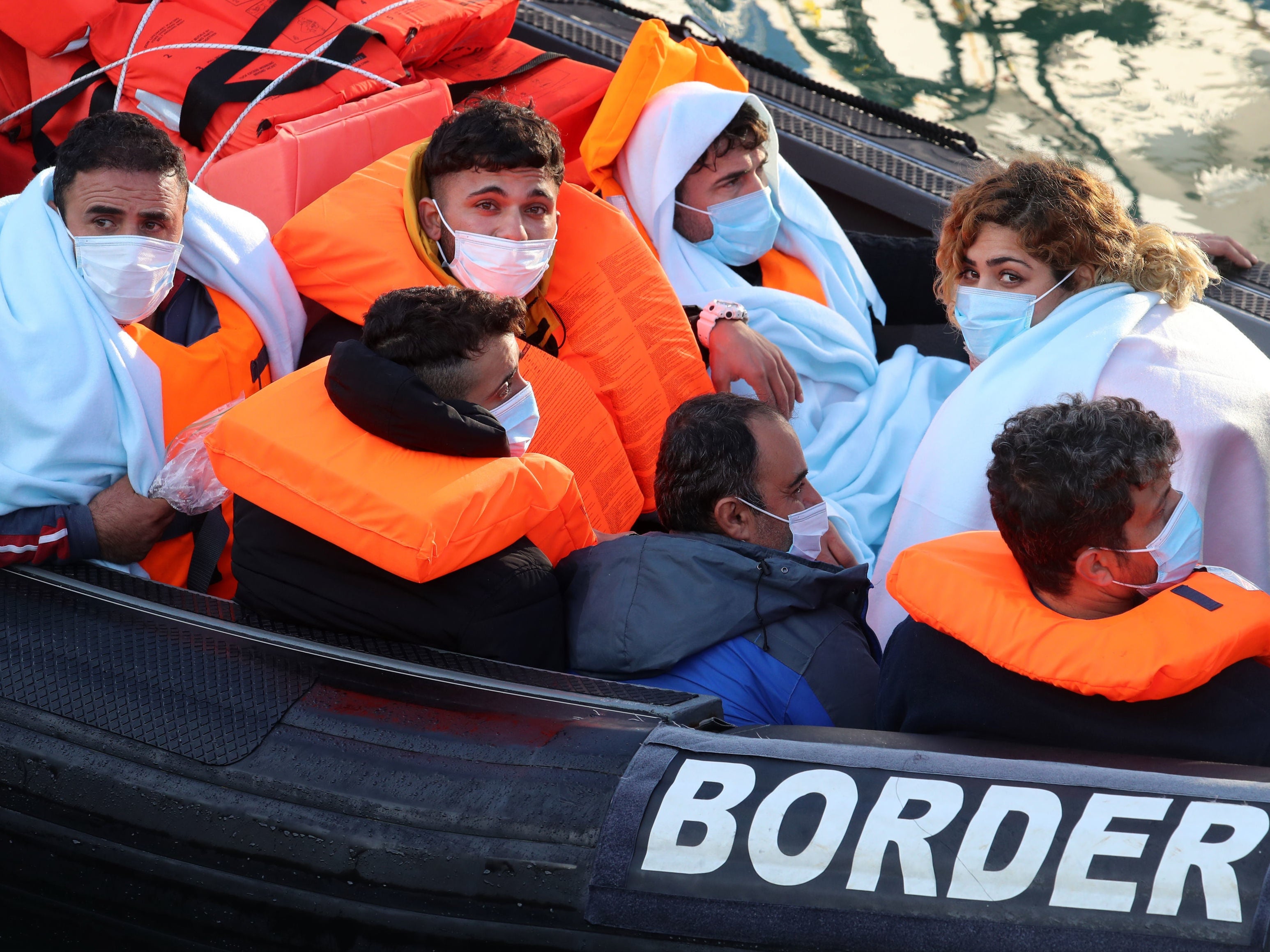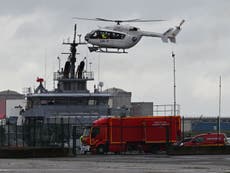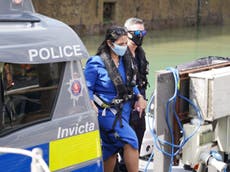Asylum seekers jailed for steering dinghies across Channel despite ‘not being part of criminal gangs’
Exclusive: Crown Prosecution Service issues new guidance amid questions over whether charges are in the public interest

Your support helps us to tell the story
From reproductive rights to climate change to Big Tech, The Independent is on the ground when the story is developing. Whether it's investigating the financials of Elon Musk's pro-Trump PAC or producing our latest documentary, 'The A Word', which shines a light on the American women fighting for reproductive rights, we know how important it is to parse out the facts from the messaging.
At such a critical moment in US history, we need reporters on the ground. Your donation allows us to keep sending journalists to speak to both sides of the story.
The Independent is trusted by Americans across the entire political spectrum. And unlike many other quality news outlets, we choose not to lock Americans out of our reporting and analysis with paywalls. We believe quality journalism should be available to everyone, paid for by those who can afford it.
Your support makes all the difference.Migrants are being jailed for steering dinghies across the English Channel despite an official report finding that there are “no organised crime group members” on board.
The Home Office has been pushing to criminalise crossings after Priti Patel’s vow to make the route “unviable” was followed by record numbers over the summer.
Its immigration enforcement unit is analysing drone footage of small boats to single out migrants to be prosecuted for steering them.
The Crown Prosecution Service (CPS) issued new guidance to lawyers last month after internal debate over whether such charges were in the public interest, The Independent can reveal.
A document said the offence of assisting unlawful immigration could be applied to asylum seekers who steer boats because they have “facilitated” a journey.
The offence was previously used to prosecute people smugglers who bring migrants to the UK for profit, such as lorry drivers and members of organised crime networks.
Nick Thomas-Symonds, Labour’s shadow home secretary, called for the CPS to make the internal guidance public in order to allow proper scrutiny.
“The government’s whole approach to Channel crossings has lacked compassion and competence,” he told The Independent.
“The home secretary should be working with her French and international counterparts and finding safe routes, including the reopening of the Dubs scheme and the Home Office’s refugee resettlement scheme.”
Eight migrants who admitted steering boats have been jailed since August, with sentences ranging from 16 months to over two-and-a-half years. After serving their prison terms, they will be eligible for deportation.
A solicitor who has worked on immigration cases in Kent for more than a decade said there had been a shift in policy to charge “asylum seekers who put their hands on the tiller”.
The lawyer, who wanted to remain anonymous, told The Independent: “They simply never prosecuted people in these circumstances before, it’s got Priti Patel’s fingerprints all over it in my view. A lot of prosecution barristers are very uncomfortable.”
Steve Dann, the Home Office’s deputy clandestine channel threat commander, told a press conference in September that dinghy pilots made up the bulk of over 100 arrests linked to Channel crossings.
“There are a lot more of those cases coming through the courts,” he added.
“This is not just about waiting until they arrive here and launching an investigation, we are using aerial assets to identify the pilots of these vessels.”
Campaigners said the policy meant authorities were criminalising asylum seekers for “trying to save lives” by steering boats safely during dangerous journeys.
A Kurdish-Iranian family including two children and a baby drowned last month, after their boat sank in the worst disaster of its kind in the English Channel.
Charities called for the government to increase safe routes for claiming asylum in the UK after the tragedy, but the home secretary repeated vows to “use the full force of the law to put organised criminals behind bars”.
In a report on small boat crossings published last week, the Independent Chief Inspector of Borders and Immigration (ICIBI) said organised criminal activity was mostly taking place in France.
The document, which was completed in March, said immigration enforcement’s Criminal and Financial Investigation team found small boat investigations “difficult because there were no organised crime group members onboard the boats, although one of the migrants might have agreed with the facilitators to act as a ‘chaperone’ for a reduced fee”.
Some of the men jailed for steering boats paid full price for their journey and a Yemeni asylum seeker previously told The Independent smugglers forced him to facilitate journeys before he was allowed to cross the Channel himself.
The man said he was threatened with violence and criminal prosecution, after smugglers filmed him preparing boats and claimed they would send the footage to police.
In press releases announcing the imprisonment of migrants for steering dinghies, the Home Office has called them “people smugglers”.
But the label does not fit the UN Refugee Agency definition of smugglers as facilitating journeys for “a financial or other material benefit”.
Bella Sankey, the director of Detention Action, said the Home Office was “conflating what everyone understands a people smuggler to be” with asylum seekers risking their own lives to reach the UK.
“There is no way it can be in the public interest to prosecute people who come to the UK seeking safety for simply trying to arrive here alive and protect the lives of people they are travelling with,” she added.
“People coming to claim asylum themselves and risking their lives are clearly in a completely different category to organised crime bosses who don’t have respect or care for people’s lives.”
Ms Sankey said asylum seekers who steer boats should be exempt from prosecution for facilitating unlawful immigration, and that the offence should be reserved for people “using it as a business”.
She also dismissed the government’s argument that jail sentences will deter crossings, saying that migrants in northern France are unlikely to hear news of the court cases.
“Often they won’t know about the consequences or they will think it’s worth the risk,” Ms Sankey said.
The CPS said people who pilot boats have always been liable for prosecution but the position was “clarified” in a note issued to prosecutors in October, due to the increasing number of these cases being referred.
Frank Ferguson, CPS immigration crime lead, said: “Every case referred to us is independently considered on its own merits and with reference to our legal tests, including whether a prosecution is in the public interest.
“The standard approach to immigration cases is to consider prosecution for those who have played a significant role in facilitating illegal entry to the UK, which includes those who pilot small vessels.”
A Home Office spokesperson said: “Any suggestion that the Home Office has put pressure on the CPS is completely wrong.
“Our criminal Investigations teams bring cases to the CPS, which then independently decides whether there is enough evidence to bring a prosecution.
“Our approach to this issue has been upheld by the courts, which have handed down convictions and passed significant sentences against individuals piloting the vessels, assisting illegal entry, and putting lives at risk.”





Join our commenting forum
Join thought-provoking conversations, follow other Independent readers and see their replies
Comments